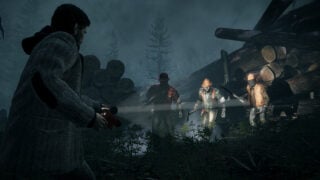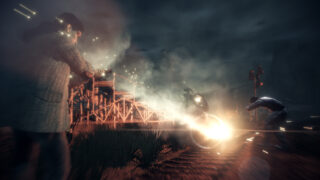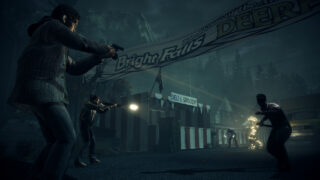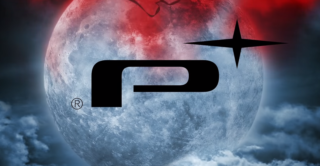Interview: Remedy discusses Alan Wake Remastered and what’s next
“We present the vision we wanted… and that’s without HDR”

Eleven years after the release of Alan Wake, Remedy decided to go back to its critically acclaimed Xbox console exclusive and give it the remaster treatment.
Alan Wake Remastered was released earlier this month and not only gives the game a host of visual upgrades to make it look more like a current-gen title, but also brings the series to PlayStation for the first time.
The result is a remaster that has been met with similar critical acclaim, and now all eyes are on what’s next for Alan Wake.
With reports online suggesting that a full sequel is on the way, VGC spoke to Remedy‘s communications director Thomas Puha and community manager Vida Starčević to discuss Remastered and try to crack the mystery of a potential Alan Wake 2.
Puha and Starčević were talking to VGC’s Chris Scullion via video call.
This was a remaster that fans had been waiting to see for a long time. Was this something that had been planned for a while, and if so was there any reason that led to it taking 11 years?
Puha: [laughs] There are a few reasons, but if we go back to 2019, that’s when we got the publishing rights back from Microsoft. We held the IP before that, but these things can be quite complicated. But once we got the publishing rights back, the road was a lot clearer in terms of ‘we can do it now’.
I just want to make sure Microsoft doesn’t come across as bad, though. There would be no Alan Wake without Microsoft in the first place. You know, we had to take the game off the shelves back in 2017 when the music licences expired, and it was out for something like a year, and Microsoft was really helpful in getting those licences back.
And then, we never had Alan Wake on modern platforms, and have never had it on PlayStation at all, so we’ve always felt that there’s a sizeable audience out there who’ve never had the opportunity to play the game so once we got the publishing rights back it was pretty clear that ‘okay, we should, and we want to, make a remaster’, and really we kicked it off pretty fast then.
“We never had Alan Wake on modern platforms, and have never had it on PlayStation at all, so we’ve always felt that there’s a sizeable audience out there who’ve never had the opportunity to play the game.”
But there were other things coming into play. Remedy has 300 people in Finland but we now have structure in place that lets us work better with external partners, such as [UK studio] d3t in this case. So there’s just a lot of different variables that came into play to make it happen.
It’s clear from the finished product that this wasn’t just a simple upscaling. What exactly went into this remaster? Improved textures, character models, animations, some (or none) of those?
Puha: I like that you said “some” [laughs]. It’s taken somewhere around 16 months, so it’s been a sizeable amount of work.
There was the original 2010 Xbox 360 game, which for the time looked great but it was running at something like 540p. Then the 2012 PC game already got some pretty significant upgrades in the rendering side of things.
And if you look at the original PC game on a high-end PC today it actually holds up pretty well, which is a testament not just to our tech but our art direction in general, in that the mood and these sorts of things are still cool.
But to really bring the game to new platforms you still have to redo a whole lot of things. Everything from the renderer to DX12 support. D3T has touched over 100,000 assets, so it’s almost everything from foliage to props to character models, everything’s gotten some level of upgrade.
We changed the Alan Wake character model so it now actually looks like the actor, so there’s just more consistency, because we have the live-action things in the game where it’s obviously Ilkka Villi, the actor, and then the in-game character looked a bit different so there’s better consistency there now.
But also, it just takes a huge amount of work just to get back to where you were on a modern platform. You have to rebuild so many things on the tech side, and then the really tricky thing was to ensure the mood stays right, the lighting stays true to the original and the overall vibe is what we tried to do back in 2010 and 2012.
But when the resolution goes up to 4K, everything from the draw distance and so on becomes so much more improved that it’s a tricky balance to ensure that it stays loyal to what the original vision was. It has to look better, but it kind of has to look the same.
The decision was made not to include ray-tracing in the game. Given that it’s a game about a man with a torch and light is one of the key mechanics of the game, there will be some who would have been a little disappointed by this. Was it just a case that it would take too long to implement?
Puha: In short, yes, but there’s a variety of reasons. It was never really on the cards because the remaster is the old game engine, which is Remedy’s tech, upgraded to the present, as opposed to, let’s say, copy and pasting the old game onto the current Northlight engine which just would have been way too much work, and then we wouldn’t really even be talking about the remaster at this point. So that wouldn’t have been realistic.
So some time was spent with d3t looking into doing the raytracing but ultimately the amount of time we had and resources, and just the amount of effort that would have taken was just better spent elsewhere.
I mean, we’re shipping… I want to say 9 SKUs, there’s the previous generation on PS4 and Xbox One and all the different permutations there, and then you have to make sure the next-generation consoles are well taken care of, so we chose to ensure that all the different platforms were as optimised as we could, within reason, for those platforms.
“Some time was spent with d3t looking into doing the raytracing but ultimately the amount of time we had and resources, and just the amount of effort that would have taken was just better spent elsewhere.”
So PS5 and Series X you get 4K 60fps, Xbox One X and PS4 Pro get Quality and Performance modes where you can run 30fps or 60fps, so it’s just a huge amount of work and you can’t do everything.
And HDR was the same thing – while I get that people are like “oh, it’s a game that has so much to do with light, HDR will be perfect,” I still always like to think that our art folks are somewhat better placed to tell what looks great and true to the original game.
Of course we get that some folks might be disappointed, but I hope when they see the actual game they’re going to be pretty happy about how it looks.
You mentioned HDR there. Obviously the new Xbox formats have this ‘auto HDR’ feature which can be retrospectively applied to older games, and even the original Xbox 360 version of Alan Wake can have HDR applied with this function.
Is that something you’d be curious to see potentially being applied to the remaster?
Puha: Well, it’s not that clear-cut. I mean, we present the vision we wanted, right, and that’s without HDR. It’s really the consumer’s choice on what they want to do.
Ever since Max Payne, Remedy has nailed the formula of making these visually detailed, 10-12 hour long third-person adventures. Despite it being over a decade old now, were you hopeful that Alan Wake would still feel like a modern game that holds up alongside the likes of Control?
Starčević: Yes, absolutely, because like you say, it has that Remedy DNA, the Remedy style that a lot of people have fallen in love with in Control, and obviously Control comes from Alan Wake in a way because it’s us learning from Alan Wake and applying those learnings to Control.
So I think it absolutely can go the other way around, so if you loved Control you will definitely love Alan Wake because it has that signature storytelling style and very compelling mystery and conflict within the story that hooks people in.

Obviously you’d like both newcomers and long-time fans to play the game, and with it coming to PlayStation there will be people playing it for the first time. During development, though, was the general feeling that this was a remaster designed more for new players or existing ones?
Starčević: I think it’s definitely a balance, because if you come back to what Thomas was saying about the remaster and how we need it to look modern but still true to the original, you can apply that to our thinking of just the remaster itself.
So yes, absolutely, we are making it for people who have been fans for 11 years, and for people who have been fans for 5 minutes, or since AWE, which was August 2019.
Puha: Well, 2020.
Starčević: 2020? Time is not real, I’m so sorry. [laughs]
We missed a whole year out, don’t worry about it.
Puha: At the end of the day, we’re very happy if people who already have it buy it, and new people can also buy it. [laughs]
So everybody buy it, basically?
Puha: Yeah. Like Vida said, of course we want new folks to see what Alan Wake is about but of course we’re realistic that it’s an 11-year-old game so some conventions have moved on.
And of course older fans might already have the game on PC or Xbox 360 and maybe they want to play it in 4K and 60fps. The main thing was to bring it to modern platforms and try to reach more people.
And of course, quite a lot of people played the AWE expansion which was very heavily about Alan Wake so if you kind of came in with that and only played Control and might have been like “wait, what is the source of this,” now you have the opportunity to learn more.
“Quite a lot of people played the AWE expansion which was very heavily about Alan Wake so if you kind of came in with that and only played Control and might have been like “wait, what is the source of this,” now you have the opportunity to learn more.”
Speaking of not knowing what year it is anymore, how did the pandemic affect Remedy? We’ve asked this question to a number of studios and the responses have varied quite a bit.
Puha: For Remedy in general, knock on wood, we’re lucky that we’re able to work. I mean, we’re in the office now, some of us, but we shipped a lot of stuff remotely. We shipped the Control Ultimate Edition, AWE, PS5, Series X, everything remotely. So it’s doable.
But quality control is tough when the teams are big anyway, because there’s no one person who knows everything, especially when there’s that many platforms. But when you’re remote it’s a lot more difficult.
Because in an office it’s like, you can walk into a meeting room or a QA room and there’s every console build or PC build and a bunch of us can take a look at it, from art director to visual effects to producer, and we can all look at it.
But remotely, everyone has wildly varying setups at home, so that visual quality control is a lot trickier and it’s just easier to collaborate when you’re all in the same room or physical space. But ultimately, we can get by, and of course this game was entirely done remotely so I’d say it’s definitely been more challenging on d3t in this case than for us.

But it really varies: we could talk for a very long time on this topic but it really depends on which part of the project you’re in. Once you know what you’re doing and it’s just creating, or coding, or especially when you get to the shipping stage, it’s pretty clear what you need to do.
It’s all the stuff before, the more sort of creative work, and the planning and all of that which is a lot more challenging remotely.
Remastered includes the two DLC releases, The Signal and The Writer, which is brilliant to see. If this sells well, do you have any interest in remastering Alan Wake’s American Nightmare too, or would that involve negotiating with Microsoft again?
Puha: No, I mean, Remedy published American Nightmare ourselves, the PC version I think. That was never really – I mean, there’s no plans currently.
For this remaster it was really “okay, it’s the original game and the two DLC story episodes and that just makes for a sensible Alan Wake experience and package, and that’s how we approached it. So no, no plans for American Nightmare at all.
Obviously you’ve got Alan Wake Remastered out now, and you had AWE before that. There were reports that Remedy and Epic had done a two-game deal, and the FAQ on the Alan Wake website says the game “has always been more about introducing Alan Wake to new audiences rather than remaking the game”.
With all that in mind, is the plan that the success of this game and the re-establishment of the Alan Wake universe will lead to Alan Wake 2, or is the remaster your way of drawing a line under the story?
Puha: [long pause] I’m only here to talk about Alan Wake Remastered and I can only reiterate that the point of that was to bring it to a larger audience, and that’s all we’re going to say on that topic.




















